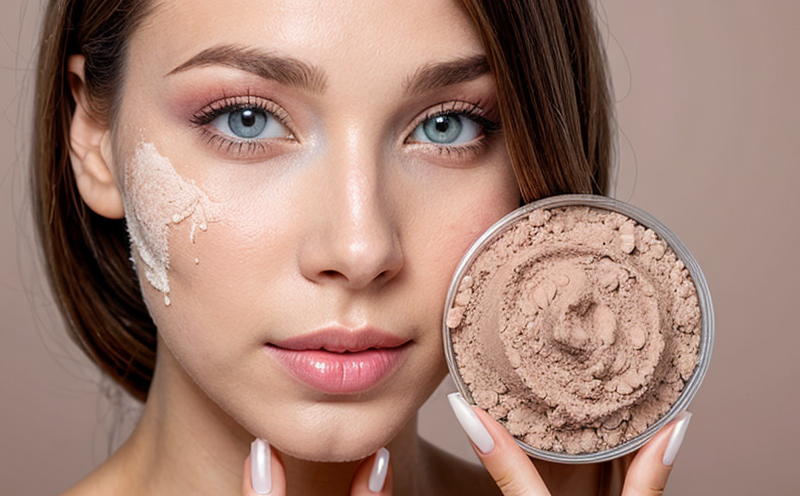Geraniol Allergen Testing in Skin Care Products
In today’s highly competitive and increasingly regulated cosmetics industry, ensuring product safety is paramount. Geraniol, a widely used fragrance component in skincare products, must be rigorously tested to ensure it does not cause adverse reactions. This service focuses on allergen testing for geraniol in skin care products, providing peace of mind for manufacturers and consumers.
Geraniol is known for its sweet, flowery aroma and is commonly found in perfumes, lotions, shampoos, and other skincare items. However, like many natural ingredients, it can be a potential allergen, especially when used at higher concentrations or in certain formulations. Regulatory bodies around the world emphasize the importance of thorough testing to prevent allergic reactions and ensure compliance with international standards.
Our laboratory employs advanced methodologies to assess geraniol’s potential for causing sensitization and allergic contact dermatitis. This service is essential for quality managers, compliance officers, R&D engineers, and procurement teams looking to enhance product safety and meet regulatory requirements. By choosing this service, you can ensure your products are free from unnecessary allergens, thereby protecting the health of your customers.
The testing process involves a series of steps designed to identify potential sensitizers in formulations containing geraniol. These steps include:
- Initial sample collection and preparation
- Skin patch testing on human volunteers
- Detailed analysis using chromatographic techniques
- Compliance with international standards such as ISO 16128-3:2017
The results of these tests are critical for formulating safe and effective skincare products. Our laboratory is equipped with state-of-the-art instruments that ensure the accuracy and reliability of our test results.
By partnering with us, you can trust that your products undergo rigorous testing to meet global standards. This service not only helps in product safety but also contributes significantly to your brand's reputation for quality and integrity.
Scope and Methodology
| Scope | Description |
|---|---|
| Sample Collection | Carefully collected from the formulation or product matrix. |
| Skin Patch Testing | Performed on human volunteers to assess sensitization potential. |
| Analytical Techniques | Incorporates GC-MS and LC-MS/MS for precise quantification. |
The methodology for geraniol allergen testing is comprehensive, ensuring the accuracy and reliability of results. The process begins with meticulous sample preparation to ensure that all components are in a form suitable for analysis. From there, we conduct skin patch tests using human volunteers who have not previously been exposed to the product or its ingredients.
The analytical techniques employed include Gas Chromatography-Mass Spectrometry (GC-MS) and Liquid Chromatography-Tandem Mass Spectrometry (LC-MS/MS), which are instrumental in detecting even trace amounts of geraniol. These methods allow us to quantify the concentration of geraniol present in the sample, ensuring that no potential allergens slip through unnoticed.
| Acceptance Criteria | Description |
|---|---|
| Percentage Sensitization Rate | Absence of sensitization in the tested population. |
| Quantitative Limits | Defined by international standards and internal quality control. |
The acceptance criteria for this testing are stringent, ensuring that only products meeting the highest safety standards leave our laboratory. Our results are presented in a detailed report that includes all relevant data points, allowing clients to make informed decisions about their product formulations.
Customer Impact and Satisfaction
The impact of this service extends beyond the laboratory; it significantly benefits customers by enhancing product safety and ensuring compliance with regulations. Quality managers, compliance officers, R&D engineers, and procurement teams all benefit from our rigorous testing process.
For quality managers, this service provides assurance that their products are free from allergens, thus reducing the risk of adverse reactions among consumers. Compliance officers can use these results to demonstrate adherence to international standards like ISO 16128-3:2017, which is crucial for navigating complex regulatory landscapes.
R&D engineers gain valuable insights into the potential sensitization risks associated with their product formulations. This information can be used to refine formulas and improve overall product safety. Procurement teams benefit from this service by ensuring that they source only safe and compliant ingredients, thus avoiding costly recalls or reputational damage.
Our commitment to customer satisfaction is reflected in the high level of accuracy and reliability we achieve in our testing processes. We strive to provide timely reports with detailed analysis, helping clients make informed decisions swiftly. This service not only enhances product safety but also contributes to building a reputation for quality and integrity within the industry.
International Acceptance and Recognition
The global nature of the cosmetics industry necessitates adherence to international standards, which our laboratory is well-equipped to provide. Our testing methods are in line with internationally recognized standards such as ISO 16128-3:2017, ensuring that your products meet the highest safety and quality benchmarks.
ISO 16128-3:2017 provides a framework for assessing allergens like geraniol in skincare products. This standard is widely accepted across borders and ensures consistent testing methods worldwide. By following these guidelines, we ensure that our results are comparable and recognized globally.
Our laboratory’s adherence to international standards not only enhances the reputation of your product but also facilitates easier market entry into various countries. Compliance with global regulations can be a significant advantage in today’s interconnected marketplace.





